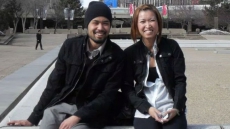WINNIPEG — RCMP have arrested a Winnipeg man on the suspicion that he may carry out terrorist activities or help a terrorist group.
Aaron Daniel Driver, 23, was arrested after a raid Thursday in a suburban home. He appeared briefly in court Friday, where police filed an application for a peace bond that could impose limits on Driver's activities.
He is being kept in custody until his next court appearance Tuesday.
The RCMP have not charged Driver with a criminal offence, but allege in provincial court documents that they have reasonable grounds to believe he "will participate in or contribute to, directly or indirectly, the activity of a terrorist group for the purpose of enhancing the ability of any terrorist group to facilitate or carry out a terrorist activity."
The Mounties refused to provide more details and would not confirm published reports that Driver's arrest is connected to a social media account under the name Harun Abdurahman.
In February, the Toronto Star reported that Abdurahman called last October's attack on Parliament Hill by Michael Zehaf-Bibeau "justified" retaliation for Canadian military aggression against Islamic State. The newspaper reported that Abdurahman was an online alias.
Neither a lawyer who appeared on Driver's behalf nor the Crown attorney on the case returned messages seeking comment.
Amarnath Amarasingam, a post-doctoral fellow at Dalhousie University who studies radicalization and terrorism, said Driver posted for at least several months under the Abdurahman Twitter handle, which has since been taken down. Amarasingam said Friday he has talked to Driver's father.
He said Driver's Twitter posts displayed a dislike of Canada and a desire to move overseas.
"He started to feel like he didn't really fit in here very well and he wanted to be in a more Muslim country," Amarasingam said.
Under a peace bond, people can be required simply to keep the peace and be of good behaviour for a year. However, judges can also impose conditions such as wearing an electronic monitoring device, observing a curfew, or remaining within the city or country.
People who refuse to agree to the terms or violate them can be jailed for up to one year.
Jeremy Laurin, press secretary to Public Safety Minister Steven Blaney, said in a statement Friday that the threat of jihadi terrorists is real in Canada.
"The first duty of any government is to ensure the safety of its citizens," said Laurin. "That is why our government has tabled the Anti-Terrorism Act ... which enhances the ability of our police officers to detain suspected terrorists before they can harm Canadians."
There have been protests against Bill C51, with opponents saying it would allow the government to stifle protest and dissent, and would infringe upon Canadians' civil liberties and right to privacy.
The wide-ranging bill would give police much broader powers and give new powers to Canada's spy agency.





